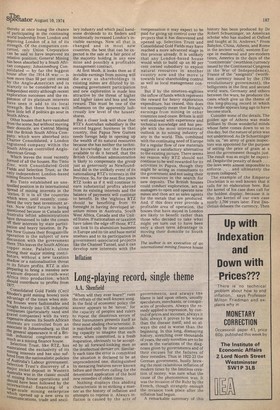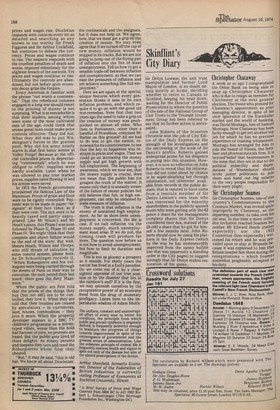Long-playing record, single theme
A.A. Shenfield
"When will they ever learn?" runs the refrain of the well-known song. In the field of economic policy the answer appears to be 'never,' for the capacity of peoples and rulers to repeat the disastrous errors of their forerunners presents itself as their most abiding characteristic. It is matched only by their astonishing capacity to imagine that each error, when committed, is a fresh inspiration, obviously to be accepted by all forward-looking men as the intellectual dernier cri. Similarly each time the error is committed the situation is declared to be an unprecedented one, distinguished by menacing features never known before and therefore calling for the determined application of the bold new remedies of olden times.
Nothing displays this abiding characteristic in so striking a manner as the history of inflation and attempts to repress it. Always inflation is caused by the acts of governments, and always the blame is laid upon others, usually speculators, merchants, or conspiracies of producers. Always the remedy applied is repression, by control of prices and incomes; always it fails; always it proves to be worse than the disease itself; and so always the end is worse than the beginning. In this long, dismaying history, stretching over thousands of years, the only novelties are to be seen in the variations of the diagnoses given by governments and of their excuses for the failures of their remedies. Thus in 1922-23 the German government, busily brewing the most calamitous inflation of modern times by the limitless creation of money, was sure what the cause of the phenomenon was. It was the invasion of the Ruhr by the French, though strangely enough the invasion took place after the inflation had begun.
A remarkable summary of this history has been produced by Dr Robert Schuettinger, an American scholar who has studied at Oxford and taught at St. Andrews.* From Babylon, China, Athens, and Rome in the ancient world, western Europe in mediaeval and pre-modern times, America in the days of the "continentals" (worthless currency issued by the Continental Congress in the War of Independence), France of the "assignats" (worthless currency issued by the 1793 revolutionary government), the belligerents in the first and second world wars, Germany and others between the wars, he produces the cases which give us the theme of this long-playing record in which the needle appears long ago to have become stuck.
Consider some of the details. The golden age of Athens was made brilliant by those wonderful minds whose fame comes down to us to this day, but the nature of price was not understood. As Dr Schuettinger tells us, "an army of grain inspectors was appointed for the purpose of setting the price of grain at a level the government thought just. The result was as might be expected. Despite the penalty of death. . the laws were almost impossible' to enforce . . . and ultimately the system collapsed."
The example of the Emperor Diocletian is so well known that it calls for no elaboration here. But the kernel of his case does call for the boldest display, because it is also the kernel of our own case nearly 1,700 years later. First Diocletian debases the currency. Then prices and wages rise. Diocletian responds with controls every bit as detailed and searching as any known to our worthy Sir Frank Figgures and Sir Arthur Cockfield, but continues to debase the currency. Prices and wages continue to rise. The emperor responds with the cruellest penalties of death and worse, imposed relentlessly for the slightest breach of the controls. Yet prices and wages continue to rise. Ultimately the controls are abandoned, but not before grim economic decay grips the Empire.
Every American is familiar with the phrase "not worth a continental." That the rebellious colonies engaged in a long war should resort to the printing of money is not surprising. What is so remarkable is that their leaders, among whom were some of the most cultivated men of the age, could think that severe penal laws could make price controls effective. They did not. What they did was to put Washington's forces in the gravest peril. Why did his army nearly starve in.that first bitter winter at Valley Forge? Because at the official controlled prices in depreciating "continentals" which he was obliged to offer, supplies were hardly available. Later when he was allowed to pay true market prices, supplies came flowing in and his armies were saved.
In 1973 the French government proclaimed the famous Law of the Maximum. Prices of grain and flour were to be rigidly controlled. Payment was to be made in paper "assignats" at their face value, as if they were coin. The rich were to be heavily taxed and partly expropriated. Like Mr Nixon's and Mr Heath's plans, this Phase I was soon followed by Phase II, Phase III and Phase IV. We might think that their complete and abject failure would be the end of the story. But wait. Messrs Heath, Wilson and Thorpe, who still dream of salvation by some control system, please note. As Dr Schuettinger records it, "When Robespierre and his colleagues were being carried through the streets of Paris on their way to execution, the mob jeered their last insult: there goes the dirty Maximum."
When the public are first told that the prices of the things they buy (but not sell) are to be controlled, they love it. When they are told that their troubles are caused by speculators — in currencies, land, houses, commodities — they love it more. When the property developer appears in a BBC TV children's programme as a stereotyped villain, worse than the bold bad baronet of yore, no protests are .heard. But the public gets tired of these delights. As misery persists and deepens they turn and rend the Robespierres whom first they cheered.
"But," it may be said, "this is old hat. We know all about Diocletian, the continentals and the assignats, but it does not help us. We agree, now, that we must get a grip on the creation of money. We may even agree that if we turned off the tap of new money, inflation would be stopped in its tracks. But we are not going to jump out of the frying pan of inflation into the fire of mass unemployment. Tell us how to get a sensible trade-off between inflation and unemployment, so that we can ease the pressures of inflation and yet achieve something like full employment."
Here we are again at the special, unique features which every generation thinks it sees in its own inflation problem, and which require it to go on with the good old non-remedies. Note first that two years ago the need to take a grip on the creation of money was poohpoohed on almost all sides. Who then in Parliament, other than a handful of Powellites, criticised Mr Barber on this ground? All we had to do was to get the nation, renowned for its commonsense, to see that the key to happiness was restraint in prices and wages. Then we could go on increasing the money supply and get high growth with full employment. The beginning of awareness, which we now see, that the money supply is crucial, does not mean that the public has yet grasped the truth of the matter. It means only that it is uneasily aware of the failure of recent policies but still believes that full, or high employment, can only be obtained by some measure of inflation.
The truth is that inflation is the enemy of sustained high employment. As far as short-term unemployment is concerned, the die is cast. If we halt inflation via the money supply, much unemployment must arise. If we do not, the coming crash will produce far more. The question now before us is not how to avoid unemployment, but how to limit its duration and magnitude.
This is not as gloomy a prospect as it sounds. For thirty years the nation has lived in a fool's paradise. Do we come out of it by a clearsighted appraisal of .our true position or by the disaster that lies at the rainbow's end? If it is the first, we may astonish ourselves by the recuperative power of an economy freed from the drug of monetary profligacy. Listen here to the imperishable wisdom of Adam Smith: The uniform, constant and uninterrupted effort of every man to better his condition, the principle from which public and private opulence is originally derived, is frequently powerful enough to maintain the progress of things towards improvement in spite of the extravagance of government and the, greatest errors of administration. Like the unknown principle of animal life it frequently restores health and vigour in Spite not only of the disease but also of the absurd prescriptions of the doctor.
Arthur Shenfield, formerly Economic Director of the Federation of British Industries, is currently visiting Professor of Economics at Rockford University, Illinois.
* A Brief Survey of Price and Wage Controls from 2800 BC to AD 1952 Robert L. Schuettinger (The Heritage Foundation Inc., Washington DC)

































 Previous page
Previous page